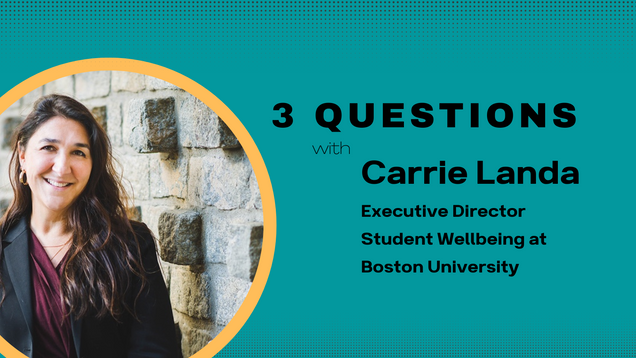3 Questions: Carrie Landa
Building a Community of Wellbeing for Our Students
Dr. Carrie Landa took on the role of executive director of Boston University Student Wellbeing in November 2021. Her mission, and the mission of countless BU stakeholders, is to create a campus environment that supports students’ growth — personally, interpersonally, and professionally.
“As Executive Director, my goal is to not only encourage students to think about what makes them feel well but to also learn from each other and our community about opportunities, perspectives and ways to enhance their wellbeing,” she says.
With a holistic approach, Student Wellbeing works collaboratively with campus leadership, staff, educators, prevention practitioners, programmers, consultants and collaborators to provide an integrated experience around wellbeing for a diverse student body. The team of four, plus student employees and volunteers, achieves this goal by providing campus-wide programming that supports our students’ wellbeing.
“Working with the entire community, we know we can help students develop lifelong skills to help them thrive as students and as graduates,” Landa says.
As an advocate, leader, practitioner, and postdoc, Landa’s commitment to student wellbeing is steadfast and spans decades. Prior to taking on the executive leadership role, she served as Boston University’s associate director of Student Health Services, and the director of Behavioral Medicine.
“Through this work, I became really interested in understanding what factors contribute to how students feel well, whether they may have a diagnosed mental health issue, or not,” she shares. “And in 2019, we started The Wellbeing Project as a grassroots effort to shift the culture on campus to have students realize the many ways which students can engage in their wellbeing while at BU.”
According to Landa, all members of the BU community can have a positive impact on student wellbeing. “Whether we are a faculty or a staff member, we all play a pivotal role in creating a campus culture that prioritizes the wellbeing of our students,” she says. “We know that when students feel well, they do well. Wellbeing is a driver of academic success which underscores the importance of fostering wellbeing on our campus.”
Dr. Landa is the keynote speaker at the BU Women’s Guild Newcomers Welcome Event on October 14 (event is at capacity). The Women’s Guild connected with the University’s accomplished executive director to discuss the importance of student wellbeing.
Q1: How would you assess the student wellbeing landscape today nationally and here at BU overall?
The landscape has changed drastically over the past decade, with significant focus on mental health in higher education. Today’s students have grown up with gun violence, a challenging political landscape, racial injustice, and then of course, COVID. Many universities are recognizing that we need to do more to support the whole student.
Based on BU’s data from The Healthy Minds Study (Spring, 2022), only 40% of students agree or strongly agree that the University provides many resources to support all parts of their wellbeing. BU is committed to changing this. We have a generation of strong students that are incredible social advocates. Educating them about the resources and skills that can foster their own wellbeing, as an individual and as a community member, is our responsibility as educators and administrators.
“Our mission is to foster the holistic wellbeing of our students by providing opportunities and experiences that enhance all dimensions of wellbeing, while equipping students with the tools to thrive as individuals and community members,”
— Student Wellbeing at Boston University
Q2: How are colleges and universities adapting to this changing landscape? Describe BU’s Student Wellbeing initiative.
Institutions are approaching this differently, but we agree that the solution is not just more clinical resources to address mental health. Instead, institutions are recognizing the value of a holistic approach to prevention. The mission of Student Wellbeing is to provide students the opportunities to learn about and engage in their own wellness through programming and education. We want to ensure students have the resources they need to succeed and teach them how to foster their own wellbeing. When times are challenging, we want them to have a solid baseline and set of tools or skills to lean into. Everyone has a different starting point, but we can all learn new ways to feel better. We have many resources at BU but students report they are difficult to find or navigate, including resources available that support student wellbeing. Through collaborations and partnerships, we hope to elevate existing resources while identifying new opportunities.
Q3: How can BU faculty and staff positively impact students’ wellbeing?
One: Be knowledgeable about the resources on campus: You don’t need to know how to help every student, but knowing where to direct them is a great way to avoid the shuffle from one office to another. Student Wellbeing’s resource page on our website is a great tool to bookmark.
Two: Apply for a grant or launch a wellbeing program: Student Wellbeing offers grants for up to $2000 to support programming that aligns with our mission.
Three: Support your own wellbeing: This may sound cliché but we need to model wellbeing for our students. Wellbeing is a process, not an endpoint. Even if you have your own wellbeing practice, perhaps you can try something new.
About the author: Maureen McCarthy is a BU Women’s Guild Communications Co-chair; Communications Manager for BU’s Office of Digital Learning & Innovation; and Adjunct Lecturer at BU College of Communication.
 Explore our website and learn more about membership opportunities.
Explore our website and learn more about membership opportunities.
